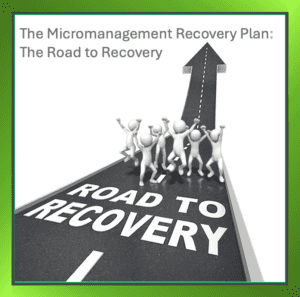The Micromanagement Recovery Plan
Recognising Micromanagement in Your Organisation

Discover how to identify and overcome micromanagement in your organisation for a healthier work environment.
Sometimes micromanagement becomes so embedded in company culture that it’s difficult to identify. Consider these warning signs:
- Team members rarely make decisions without approval
- High levels of employee burnout and turnover
- Excessive reporting requirements
- Meetings dominated by status updates rather than strategic discussions
- Managers who struggle with delegation
If these patterns sound familiar, it may be time to reassess leadership approaches within your organisation.
The Psychological Impact of Micromanagement
The effects of micromanagement extend beyond productivity concerns. Recent workplace studies have shown:
- Micromanaged employees report higher levels of anxiety and work-related stress
- Teams under constant scrutiny demonstrate decreased collaboration and knowledge sharing
- Innovation metrics fall significantly in departments with micromanaging leaders
- Employee engagement surveys consistently show lower scores in heavily supervised teams
Transitioning Away from Micromanagement
For Leaders
- Start with Self-Awareness: Acknowledge your tendency to micromanage and commit to change.
- Delegate Deliberately: Begin with smaller tasks and gradually increase responsibility as confidence builds.
- Embrace Mistakes as Learning Opportunities: Create an environment where reasonable mistakes are viewed as growth opportunities rather than failures.
- Develop Your Team: Invest in training and mentoring to build capabilities, reducing the perceived need for close supervision.
- Set Clear Boundaries: Define which decisions require approval and which don’t, establishing clear autonomy zones.
For Organisations
- Review Performance Metrics: Ensure you’re measuring outcomes rather than activity.
- Implement Leadership Development: Provide coaching for managers struggling with delegation and trust.
- Create Feedback Channels: Allow team members to safely provide upward feedback about management styles.
- Celebrate Autonomous Success: Recognise and reward teams that achieve great results through independent work.
The Future of Work Demands Trust
As we move further into 2025, flexible and remote work arrangements continue to grow. These modern work environments simply cannot function under traditional micromanagement approaches. Forward-thinking organisations are embracing results-only work environments where employees are evaluated on their outputs rather than their inputs or processes.
Taking the First Step
Changing entrenched management habits takes time and commitment. Start with honest conversations about current management practices and their impact on your team. Small adjustments—like extending decision-making authority or reducing check-in frequency—can begin to shift the dynamic toward greater autonomy.
Remember that building trust is an investment in your organisation’s future. When employees feel trusted and empowered, they bring their best ideas, strongest commitment, and highest performance to work each day.
At Tick HR Solutions, we’re committed to helping Lincolnshire businesses develop healthy, productive workplace cultures where both people and organisations thrive. If you’re ready to transform your management approach and unleash your team’s full potential, we’re here to support your journey.
